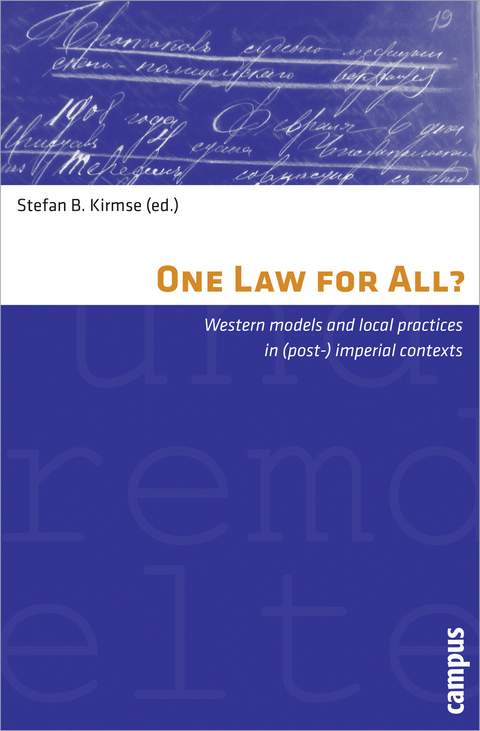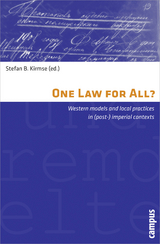One Law for All?
Stefan B. Kirmse, Ph.D., ist wissenschaftlicher Mitarbeiter am Sonderforschungsbereich 640 »Repräsentationen sozialer Ordnungen im Wandel« an der Humboldt Universität zu Berlin.
Contents
Introduction .........................................................................................7
Stefan B. Kirmse
Discussing Legal Reform
A Step for the "Whole Civilized World"?
The Debate over the Death Penalty in Russia, 1905-1917 ..................37
Benjamin Beuerle
A New Legal Order under Discussion:
Legal Reform and the Loya Jirga in Afghanistan in the 1920s ..............65
Benjamin Buchholz
Agents of Knowledge Transfer:
Western Debates and Psychiatric Experts in
Late Imperial Russia ............................................................................91
Lena Gautam
Gatekeepers to the Legal System: The Role of Legal Intermediaries
Tinterillos, Indians, and the State:
Towards a History of Legal Intermediaries in
Post-Independence Peru ....................................................................117
Carlos Aguirre
The Ties that Bind:
Sovereignty and Law in the Late Russian Empire...............................150
Jane Burbank
When People go to Court
Law and Courts as Negotiating Tools:
Marriage and Divorce in Republican China, 1912-1949 ..................181
Xiaoqun Xu
Dealing with Crime in Late Tsarist Russia:
Muslim Tatars and the Imperial Legal System ...................................207
Stefan B. Kirmse
Entanglements and Interactions within a Plural Legal Order:
The Case of the German Colony Cameroon, 1884-1916..................241
Ulrike Schaper
De jure and de facto:
The Penal Code of 1871 and Juridical Culture in Mexico City ..........263
Manuel de los Reyes Garcia Markina
Notes on Contributors ......................................................................285
Index of Names and Places ................................................................289
"There is much to like in this book and it engages an important topic from a unique perspective." Jonathan F. Parent, Law and Politics Book Review, 01.03.2013(D)er Herausgeber versteht den Band als Beitrag zur rechtssoziologischen Forschung in der Tradition der "Law and Society"-Bewegung, die Recht als Praxis analysiert und seine sozialen und kulturellen Kontexte in den Blick nimmt. So werden historische Analysen zu Lehrstücken für den Umgang mit heutigen Herausforderungen des Rechtspluralismus., Frankfurter Allgemeine Zeitung, 23.08.2012
"There is much to like in this book and it engages an important topic from a unique perspective." Jonathan F. Parent, Law and Politics Book Review, 01.03.2013 (D)er Herausgeber versteht den Band als Beitrag zur rechtssoziologischen Forschung in der Tradition der "Law and Society"-Bewegung, die Recht als Praxis analysiert und seine sozialen und kulturellen Kontexte in den Blick nimmt. So werden historische Analysen zu Lehrstücken für den Umgang mit heutigen Herausforderungen des Rechtspluralismus., Frankfurter Allgemeine Zeitung, 23.08.2012
"There is much to like in this book and it engages an important topic from a unique perspective." Jonathan F. Parent, Law and Politics Book Review, 01.03.2013
(D)er Herausgeber versteht den Band als Beitrag zur rechtssoziologischen Forschung in der Tradition der „Law and Society“-Bewegung, die Recht als Praxis analysiert und seine sozialen und kulturellen Kontexte in den Blick nimmt. So werden historische Analysen zu Lehrstücken für den Umgang mit heutigen Herausforderungen des Rechtspluralismus., Frankfurter Allgemeine Zeitung, 23.08.2012
Introduction
Stefan B. Kirmse
To avoid potential misunderstandings: "one law for all?" is not used as
a political slogan in this book. Admittedly, along with related concepts
in other languages, such as idem ius omnibus or gleiches Recht für alle, the
phrase has been used to further a wide range of political agendas. Feminist,
civil liberties and gay rights groups have utilized the slogan to call
for greater equality; racist groups in North America have exploited it as a
means to denounce the allegedly preferential treatment of minorities; and
most recently, a secularist movement in the United Kingdom has adopted
it as the title for its campaign against shari'a law, which it views as gaining
influence among British Muslims.
In this book, the phrase is neither employed to advocate a political
cause nor used to refer solely to legal equality (or the lack of it). Offering
a point of entry into the study of legal debate and practice in imperial
and post-imperial contexts, it served as a guiding research question for a
conference hosted by the Department of East European History (which
explains the strong representation of historians of Russia in this volume)
at Humboldt University in the fall of 2010. It struck the organizers of
the conference, on which this volume is based, as a useful tool to capture
different aspects of legal reform in the nineteenth and early twentieth
centuries: the drive for "modernization" and the importance of legal borrowing
in various parts of the globe; claims to legal integration and greater
equality; and the continuing specificity of legal practice and interpretation.
That said, to a degree "one law for all" is a rhetorical question. Neither
has legal homogenization ever materialized on a global scale, nor have
most polities ever put "equal justice for all" into practice. Some forms of
inequality persist even in today's liberal democracies. What is more, if the
question is used to investigate the worldwide diffusion of "Western" law,
as in the sociological "world polity" approach (see, in particular, Boyle
and Meyer 2002), it faces a twofold problem: analyses of diffusion tend
to claim either the obvious or the impossible. If diffusion is taken to refer
"only" to the imitation of Western law in different parts of the world,
it is a commonplace. Mimesis is part of most legal reform processes. On
the other hand, the spread and use of European legal norms and institutions
is best not discussed in terms of a transfer of laws from one country
to another. As critics of Watson's concept of "legal transplants" (1974)
have argued, such transfer is impossible since the law consists not only of
words but also of the culturally specific meanings attached to these words
(Legrand 2001). As a result, any analysis of legal borrowing must not only
take local adaptations and reinterpretations into account but also acknowledge
the complete novelty of the resulting laws.
Regardless of these caveats, "one law for all" remains valid not only as
an ideal for lawmakers. Thanks to its multi-dimensionality, it can also be
a useful guide for inquiry. It directs our attention to the dynamic relationship
between two competing, but often overlapping, trends that characterize
most imperial and post-imperial spaces: legal integration, on the
one hand, and the recognition and promotion of difference, on the other.
The latter, at times, even included forms of legal segregation. Framing
the inquiry in such terms allows an analysis of different steps towards, or
away from, legal equality while revealing an array of local interactions with
Western law(s).
The role of "Western" law must indeed be given careful consideration.
A focus on East-West or North-South interaction admittedly runs the
danger of being charged with "Eurocentrism"; and past inquiries into the
role of Western legal blueprints and institutions in the South, such as the
Yale Law and Modernization projec
| Erscheint lt. Verlag | 21.6.2012 |
|---|---|
| Reihe/Serie | Eigene und fremde Welten ; 25 |
| Co-Autor | Carlos Aguirre, Benjamin Beuerle, Benjamin Buchholz, Jane Burbank, Viktoria Draganova, Manuel de los Reyes García Márkina, Lena Gautam, Stefan B. Kirmse, Ulrike Schaper, Xiaoqun Xu |
| Verlagsort | Frankfurt |
| Sprache | englisch |
| Maße | 140 x 215 mm |
| Gewicht | 370 g |
| Themenwelt | Geisteswissenschaften ► Geschichte ► Allgemeines / Lexika |
| Geisteswissenschaften ► Geschichte ► Allgemeine Geschichte | |
| Schlagworte | Gesetz • Gesetze • Imperialismus • Law • Postimperialismus • Rechtsstaat |
| ISBN-10 | 3-593-39493-6 / 3593394936 |
| ISBN-13 | 978-3-593-39493-0 / 9783593394930 |
| Zustand | Neuware |
| Haben Sie eine Frage zum Produkt? |
aus dem Bereich




